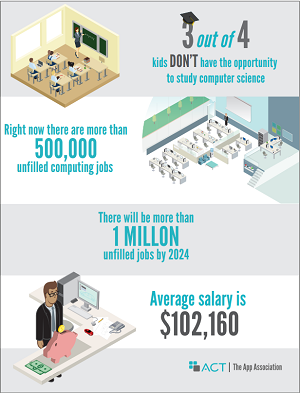News
App Economy Report: 'Big Data Will Lead the Way'
- By David Ramel
- April 24, 2017
A mobile industry association is out with its fifth annual report on the app economy, revealing there are some 500,000 computing jobs unfilled right now, and in the future, "Big Data will lead the way" as mobile apps both receive and send key data back to the cloud in real-time.
The group, called "ACT | The App Association," (ACT from here on for brevity), has published its annual State of the App Economy report to provide "a snapshot of the trends driving and defining the dynamic app ecosystem."
One such trend driving the app economy of the future is Big Data, according to the report.
"2016 was a transition year for the app ecosystem," it said. "Apps stores continued to be the primary location for people to get apps, but the power behind the applications has moved almost entirely to the cloud -- and the large data stores that reside there."
In listing one of the three biggest trends that will affect the app ecosystem in the future, the report titled one bullet point with "Apps Driven by Big Data Will Lead the Way."
It continues:
Sure, games will continue to exist, but the way we engage in enterprise, shopping, health, dating, business, manufacturing and finance activities will not just be built around machine learning, but the apps you use to interface with the cloud will be sending back key data in real-time. Mobile apps will be more than just the portal to your data, they will be a key instrument in utilizing it.
The other two of the top three future trends are:
- Everything is a Sensor -- Sensors of every imaginable type are becoming more affordable and accessible. Look for developers to improve software and use the sensors on your phone and wearables in new ways (you think your camera can only take photos? Think again!). All of the data will flow back to the cloud to power AI.
- Cybersecurity Enters the Consumer Worldview -- Those of us in tech have been talking about cybersecurity, cross-border data flows, encryption, and one-way hash for decades. But it’s still on the periphery of consumer consciousness. Mobile apps are now powering AI, accessing your money and medical records, while sensors gather information in real time. Your life is in your apps. The ability to see data, and impact your monetary or physical health, makes the security of your apps paramount.
The report also touches upon the continuing skills shortage that's especially problematic in hot fields such as mobile and Big Data development.
 [Click on image for larger view.]
Report Highlights (source: ACT | The App Association)
[Click on image for larger view.]
Report Highlights (source: ACT | The App Association)
"The app economy is particularly starved for skilled workers with computer science training, even though the average salary for developers -- one of the most critical positions in any software company -- is $102,160," the report said. "Only one in four K-12 schools teach computer science, leaving three-quarters of American students ill-equipped to enter the modern workforce. At present, more than 500,000 computing jobs are unfilled, and by 2024, there will be more than 1 million unfilled computing jobs. The United States must fund educational curriculum, from primary to post-secondary, to address the shortage of American computer science talent."
Three other key findings of the report distilled by ACT include:
- Today, the app economy is part of a thriving ecosystem worth more than $143 billion, led by U.S. companies.
- From May 2014ii through May 2016, the app economy added 110,000 new software application developer jobs to the U.S. workforce.
- 83 percent of successful U.S. app companies are located outside Silicon Valley, many of which are in rural areas.
"The app economy is stronger than ever and shows no signs of slowing," the report said. "Because apps are the gateway to the burgeoning IoT [Internet of Things], this is just the tip of the iceberg."
ACT said its report was based on data obtained in its own research and other information available from publicly available sources such as Apple App Store, Google Play, government agencies, company statements and industry publications.
About the Author
David Ramel is an editor and writer at Converge 360.